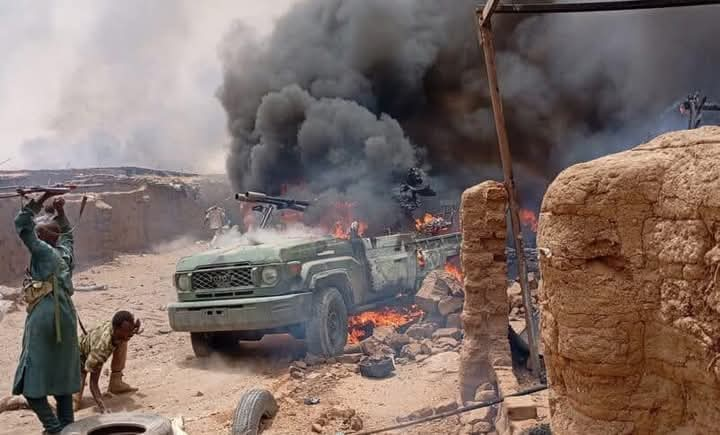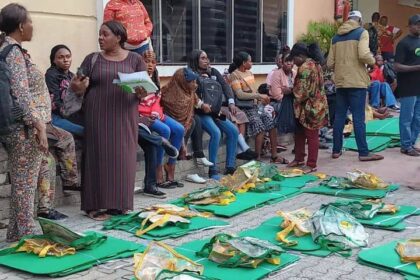
By Adeyemi Adekunle
More than 100 lives, including the lives of at least 20 children, are feared lost in a harrowing escalation of violence in Sudan’s Darfur region. The attacks, attributed to the notorious paramilitary group Rapid Support Forces (RSF), targeted the besieged city of El-Fasher and two nearby displacement camps that are grappling with famine, prompting widespread international concern.
The conflict in Sudan, which ignited in April 2023, has seen a tragic intensification as RSF forces launched well-coordinated ground and aerial assaults on Friday. The United Nations Office for the Coordination of Humanitarian Affairs reported these strikes on El-Fasher, the only state capital in Darfur remaining outside the RSF’s grasp, as well as the Zamzam and Abu Shouk displacement camps, places that have become synonymous with desperation and despair amid ongoing humanitarian crises.
Early reports from local resistance committees, volunteer groups dedicated to providing aid, suggested that the death toll from the assaults reached at least 57, with casualties including 32 civilians in El-Fasher and 25 in Zamzam. However, the Sudanese army later raised the toll to 74 dead and 17 wounded in El-Fasher alone, indicating the grim reality on the ground as chaos unfolded.
A significant factor complicating the situation is the severe communication breakdown, characterized by Internet shutdowns that have hampered information flow and limited the ability to ascertain the full extent of the devastation in Zamzam. Activists and humanitarian groups fear that the numbers may rise, but grim reports indicated a significant toll on those trying to provide aid to the afflicted, as the Sudanese Organisation for the Protection of Civilians revealed that among the dead were nine humanitarian workers associated with an international NGO providing medical assistance in Zamzam.
Clementine Nkweta-Salami, the UN Resident and Humanitarian Coordinator in Sudan, condemned the brutal killings of the aid workers, highlighting the catastrophic impact on the already vulnerable population. “The colleagues from an international non-governmental organisation were killed while operating one of the very few remaining health posts still operational in the camp,” she stated. “This represents yet another deadly and unacceptable escalation in a series of brutal attacks on displaced people and aid workers in Sudan since the onset of this conflict nearly two years ago. I strongly urge those committing such acts to immediately desist.”
In a defensive statement, the RSF dismissed a video purportedly circulating among activists that allegedly displayed the aftermath of civilian casualties in Zamzam. They characterized the footage as a “fabricated production,” accusing critics of attempting to vilify their forces. The expressions of denial come as reports of continued violence emerged, with local advocacy groups like the Darfur General Coordination of Camps for the Displaced and Refugees indicating that fresh assaults resumed Saturday morning, echoing the sounds of heavy gunfire and clashes in the area.
The dire humanitarian landscape is compounded by famine, which struck Zamzam first, making it the initial part of Sudan deemed to be in humanitarian crisis. By December, famine conditions had expanded to other camps, including Abu Shouk and Al Salam, with forecasts indicating that El-Fasher itself could be engulfed by hunger by May of the coming year.
The ongoing war, already taken a staggering toll on the nation, with tens of thousands killed and over 12 million displaced. Both the Sudanese army and the RSF have faced mounting accusations of war crimes and violations of international humanitarian law, adding further complexity to an already devastating situation.
The urgent need for intervention and support becomes ever clearer as violence and humanitarian catastrophe in Darfur serve as a somber reminder of the fragility of peace and the dire consequences of conflict, particularly for the most vulnerable.
There is an aspiration that the international community would rise to the occasion, providing necessary aid and working towards a resolution that prioritizes the safety and dignity of the Sudanese people.
The tragedy unfolding in Sudan’s Darfur region is not merely a local crisis; it is a poignant reminder of humanity’s shared responsibility to protect those who are suffering in silence. Amidst the ruins and the heart-wrenching loss, the world must rally together to shine a light on this dark chapter and advocate fervently for peace and humanitarian assistance.



